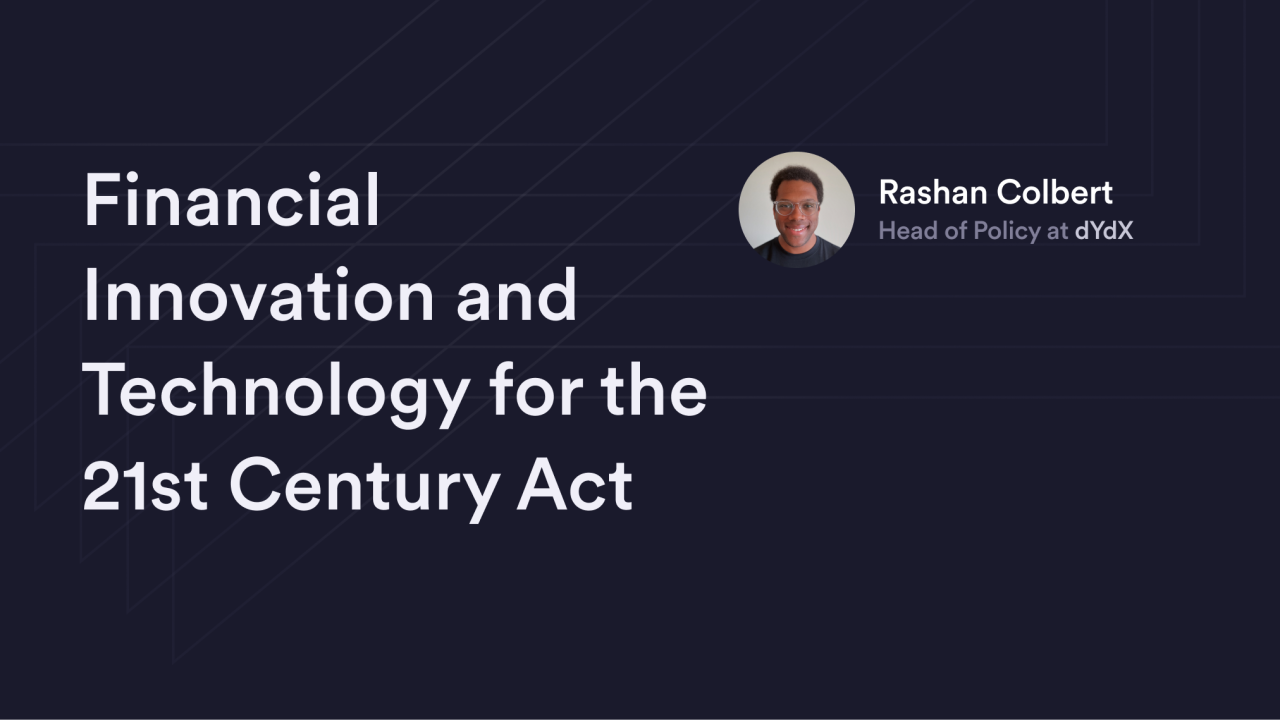


This week, the United States Congress took historic steps when the House Financial Services and House Agriculture Committees moved bipartisan crypto-focused legislation through each committee. Both committees passed the ‘Financial Innovation and Technology for the 21st Century Act,’ a bill to establish a regulatory framework for digital assets and solidify American leadership in this globally competitive space.
The public first saw this bill in draft form in early June, and it was immediately clear that it was a well considered, good faith effort showing clear subject matter expertise and an obvious dedication to getting the legislation right. We’re very happy with the effort of the House Financial Services and Agriculture Committee Chairs, and extremely pleased that they were so open to feedback from a variety of stakeholders, including industry participants, throughout the drafting process.
A Great First Step
The bill represents an excellent first step in the endeavor to appropriately regulate the digital assets industry, clearing the path for crypto to flourish and solidifying the United States as the best place to build the future of web3.
As one of the largest DeFi protocols in the world by trading volume, we at dYdX have a good understanding of how the current version of the bill would work in practice. We also understand the goal of cementing the United States’ place in advancing this technology. Particularly as the United States is still the leader in cutting edge Web3 technology development (dYdX, Uniswap, OpenSea, and others are all based in the United States) there is a clear need to get the legislation right, and to get it passed sooner than later.
Thoughtful Consideration for New Technology
In contrast to several legislative attempts in the recent past, the Financial Innovation and Technology for the 21st Century Act’s (the “FIT”) clear differentiation between centralized entities and decentralized ones is extremely refreshing. While we do believe there are likely good and necessary regulatory parameters for DeFi, anyone with sufficient understanding of the technology acknowledges that they cannot be the same as those for centralized entities.
The FIT indicates that there is significantly deeper understanding that must be gained before effective rules can be written regarding two major areas: NFTs and DeFi. From a developer perspective, we think this is beneficial as it gives the industry time to keep building tools that will solve regulatory issues relating to custody, transparency, solvency, and security that not only create positive outcomes for users, but go above and beyond what was previously possible from a regulatory perspective. The builders of this technology need adequate time to develop and scale these solutions before ineffective and inappropriate regulation is enacted that stymies their efforts.
The opening section of the draft bill appears to make it clear that NFTs are not meant to be covered by this bill. The definition of Digital Asset includes “any fungible digital representation of value” clearly excluding non-fungible assets. We applaud this decision.
Unfortunately, there is no similar explicit exemptive relief from the regulations enumerated throughout the legislation for DeFi. The time between enactment of the law and completion of the study and any rulemaking or legislating that might follow could be lengthy and might leave too much to the interpretation of regulators, who may not be interested in facilitating innovation.
Understand it Before You Regulate It
The bill calls for year-long studies to be conducted on “non fungible digital assets” and on “decentralized finance,” that will be referenced to inform any legislation that would develop subsequently. The bill calls for two DeFi studies, one jointly conducted by the Securities Exchange Commission (SEC) and Commodity Futures Trading Commission (CFTC), and a second by the Government Accountability Office (GAO). Both studies ask the government entities to explore the benefits and trade-offs of DeFi, from a policy perspective, before delivering a report to the relevant Congressional committees with legislative recommendations.
The Ancillary Activities Exclusion
In addition to the studies, the inclusion of an explicit exemption would be ideal. The bill still has a good solution for DeFi and on-chain processes within a section carving out a number of so-called “Ancillary Activities.” The bill’s text states “a person shall not be subject to this Act and the regulations thereunder solely based on the person undertaking any ancillary activities,” which includes key blockchain support and operational services and actions such as:
“Compiling network transactions”
“Providing computational work”
“Providing a user-interface”
“Developing, publishing, constituting, administering, maintaining, or otherwise distributing a blockchain system”
And more.
There will certainly come a time for specific regulations governing decentralized finance, but it is clear that they should not be the same ones that regulate centralized crypto intermediaries. The risks are different, and the technology is changing so quickly, that to rush now would be unwise. Lumping these two distinct areas - DeFi and CeFi - together would almost certainly prove to be the wrong decision, and we applaud the decision of the committees not to do that, and are eager to see the continue progress of the Financial Innovation and Technology for the 21st Century Act through the rest of this 118th Congress.
About dYdX
dYdX is the developer of a leading decentralized exchange on a mission to democratize access to financial opportunity by building open, secure, and powerful financial products. dYdX currently runs on audited smart contracts on Ethereum, which eliminates the need to trust a central exchange while trading. We combine the security and transparency of a decentralized exchange, with the speed and usability of a centralized exchange.